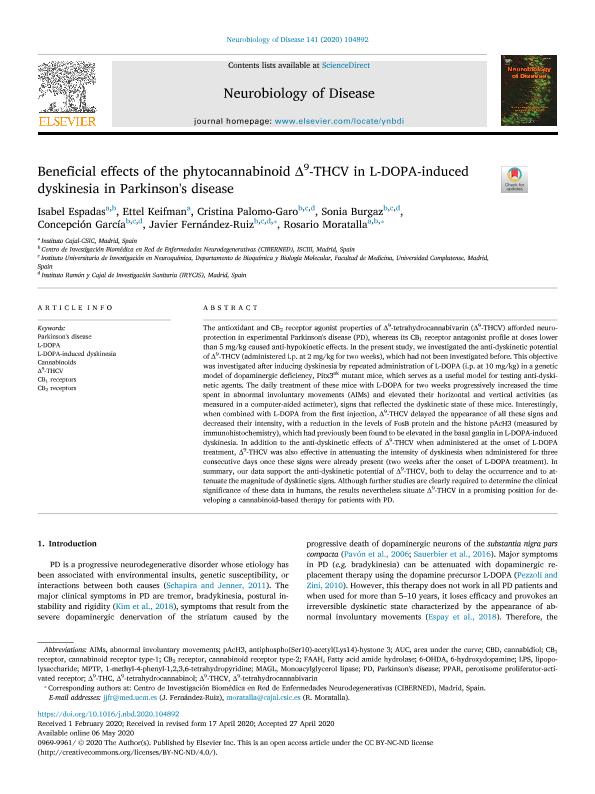Artículo
Beneficial effects of the phytocannabinoid Δ9-THCV in L-DOPA-induced dyskinesia in Parkinson's disease
Espadas, Isabel; Keifman, Ettel ; Palomo Garo, Cristina; Burgaz, Sonia; García, Concepción; Fernández Ruiz, Javier; Moratalla, Rosario
; Palomo Garo, Cristina; Burgaz, Sonia; García, Concepción; Fernández Ruiz, Javier; Moratalla, Rosario
 ; Palomo Garo, Cristina; Burgaz, Sonia; García, Concepción; Fernández Ruiz, Javier; Moratalla, Rosario
; Palomo Garo, Cristina; Burgaz, Sonia; García, Concepción; Fernández Ruiz, Javier; Moratalla, Rosario
Fecha de publicación:
07/2020
Editorial:
Academic Press Inc Elsevier Science
Revista:
Neurobiology of Disease
ISSN:
0969-9961
Idioma:
Inglés
Tipo de recurso:
Artículo publicado
Clasificación temática:
Resumen
The antioxidant and CB2 receptor agonist properties of Δ9-tetrahydrocannabivarin (Δ9-THCV) afforded neuroprotection in experimental Parkinson's disease (PD), whereas its CB1 receptor antagonist profile at doses lower than 5 mg/kg caused anti-hypokinetic effects. In the present study, we investigated the anti-dyskinetic potential of Δ9-THCV (administered i.p. at 2 mg/kg for two weeks), which had not been investigated before. This objective was investigated after inducing dyskinesia by repeated administration of L-DOPA (i.p. at 10 mg/kg) in a genetic model of dopaminergic deficiency, Pitx3ak mutant mice, which serves as a useful model for testing anti-dyskinetic agents. The daily treatment of these mice with L-DOPA for two weeks progressively increased the time spent in abnormal involuntary movements (AIMs) and elevated their horizontal and vertical activities (as measured in a computer-aided actimeter), signs that reflected the dyskinetic state of these mice. Interestingly, when combined with L-DOPA from the first injection, Δ9-THCV delayed the appearance of all these signs and decreased their intensity, with a reduction in the levels of FosB protein and the histone pAcH3 (measured by immunohistochemistry), which had previously been found to be elevated in the basal ganglia in L-DOPA-induced dyskinesia. In addition to the anti-dyskinetic effects of Δ9-THCV when administered at the onset of L-DOPA treatment, Δ9-THCV was also effective in attenuating the intensity of dyskinesia when administered for three consecutive days once these signs were already present (two weeks after the onset of L-DOPA treatment). In summary, our data support the anti-dyskinetic potential of Δ9-THCV, both to delay the occurrence and to attenuate the magnitude of dyskinetic signs. Although further studies are clearly required to determine the clinical significance of these data in humans, the results nevertheless situate Δ9-THCV in a promising position for developing a cannabinoid-based therapy for patients with PD.
Archivos asociados
Licencia
Identificadores
Colecciones
Articulos(IFIBIO HOUSSAY)
Articulos de INSTITUTO DE FISIOLOGIA Y BIOFISICA BERNARDO HOUSSAY
Articulos de INSTITUTO DE FISIOLOGIA Y BIOFISICA BERNARDO HOUSSAY
Citación
Espadas, Isabel; Keifman, Ettel; Palomo Garo, Cristina; Burgaz, Sonia; García, Concepción; et al.; Beneficial effects of the phytocannabinoid Δ9-THCV in L-DOPA-induced dyskinesia in Parkinson's disease; Academic Press Inc Elsevier Science; Neurobiology of Disease; 141; 7-2020; 1-10
Compartir
Altmétricas



